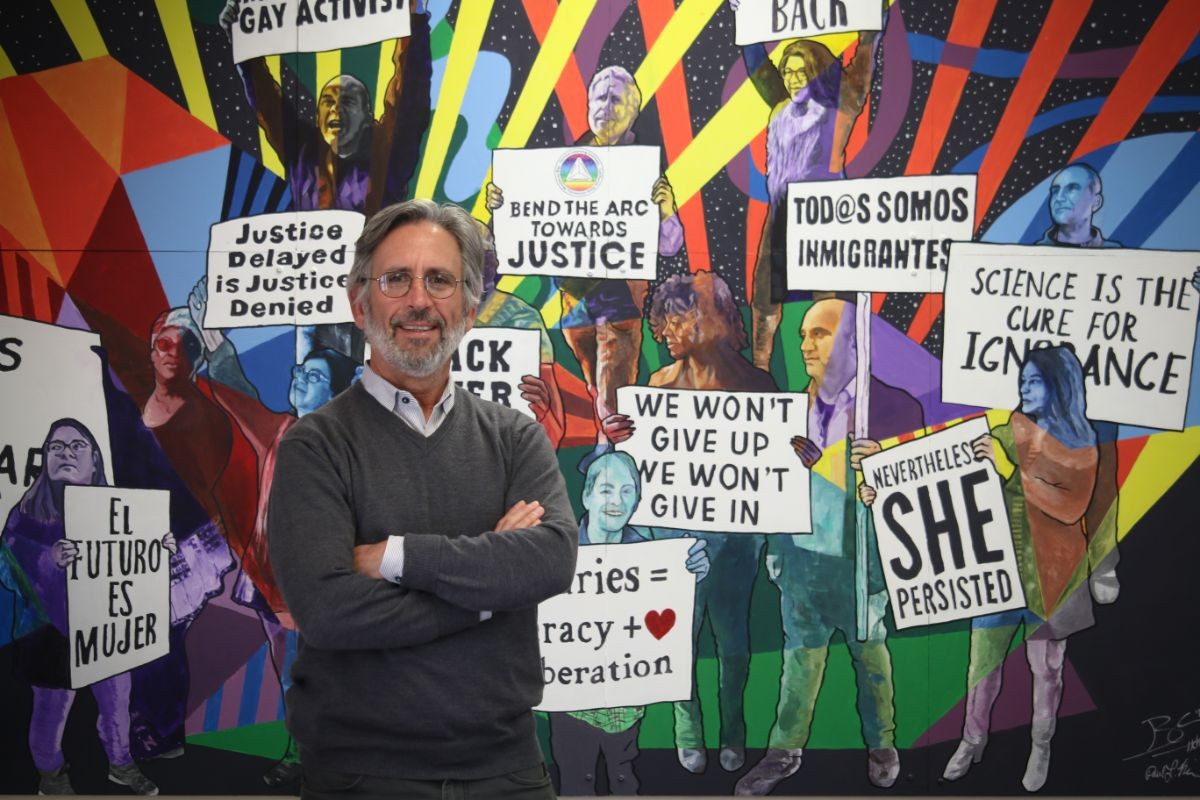CSUMB Magazine
Bringing Civics to Life

By Liz MacDonald
Published Dec. 20, 2019
What does it mean to be a good person?
That question is at the heart of Service Learning Institute Director Seth Pollack’s scholarly career.
“We’re trying to teach students to be morally-grounded, thoughtful and compassionate,” Pollack said. “It’s not just a bunch of hours to meet a requirement, and it isn’t just a component that can be added on where students apply what they’ve learned in a community setting.”
Pollack believes that service learning has the potential to transform academia. For more than two decades, he’s led the program that represents the national — and international— standard for socially-responsible and civically-engaged learning In higher education. He’s also taught the practice across the European Union and in South Africa over the course of two Fulbright fellowships.
Service learning has been part of CSUMB since its inception. “There was a nice synergy between the emergence of a national funding stream for service learning and the founding of the university,” Pollack said.
We’re trying to teach students to be morally-grounded, thoughtful and compassionate. It’s not just a bunch of hours to meet a requirement, and it isn’t just a component that can be added on where students apply what they’ve learned in a community setting.”— Seth Pollack, Service Learning Institute director
CSUMB received the first-ever grant from the Corporation for National & Community Service, a federal agency founded in 1993 to promote service and volunteerism in higher education, as well as in K-12 education across the country. The agency was looking for pilot programs, and the new university had the opportunity to do things differently from the start.
At the time, Pollack was completing his doctorate at Stanford. He became acquainted with the program and its founding director, Marian Penn, while coordinating a Fund for the Improvement of Postsecondary Education (FIPSE) grant for service learning programs across CSUMB, Stanford, Mills College and Portland State University. In 1997, two years after the university got its start, he joined the Service Learning Institute as its first faculty director.
CSUMB’s program stands out among universities for multiple reasons. Not only is it required of every graduate, it’s structured as a faculty-led academic department with curricular content. It’s an essential part of the education with clearly-defined objectives centered on teaching students about civic involvement, social justice and inequality, Pollack said.
The structure has proven highly successful. CSUMB is the only institution to be recognized twice as the leading university service learning program in the nation by the President’s Higher Education Community Service Honor Roll, receiving the inaugural award in 2006 and then another in 2010.
But seeing the actual impact on individual lives and communities is more meaningful to Pollack. At this point, CSUMB graduates have leadership roles in many area nonprofits, agencies and schools where current service learners are being placed.
“I’ll be out in the community describing how the program works to a new school or nonprofit, and the person I’m talking to will say, ‘Oh, I was a service learner.’ I’m finding over and over that our partners are our former students,” said Pollack. “We’ve created a virtuous cycle.”
That makes maintaining the relationships the program needs to work a little bit easier, although Pollack admits running a program the scale of CSUMB’s is challenging.
Each semester, we’ve got 1,700 students in more than 60 classes working with 200 partners. For our program to be real, relevant and meaningful, humans need to know each other.”— Seth Pollack
“Each semester, we’ve got 1,700 students in more than 60 classes working with 200 partners. For our program to be real, relevant and meaningful, humans need to know each other,” he said. “It takes immense time and energy to manage, build and maintain.”
Fortunately, Pollack has the support of faculty across the institution who are equally interested in transforming their scholarship into community-based research.
Biology professor Henrik Kibak and his pre-med students are a great example. They’re speaking to East Salinas residents about their healthcare challenges to better understand the factors that contribute to inadequate and inequitable medical care. In the future, when Kibak’s students are medical care providers, they’ll be equipped with both the conceptual knowledge and practical skills to contribute to improved equality and access to healthcare for their patients.
More than 20 years in, Pollack’s passion remains high, and the service learning program continues to evolve. Last year, the lower-division courses were reimagined to better align with the CSU’s general education requirement for civics.
“We have the opportunity to do transformative work to bring civics to life, make it not something you memorize but something you participate in,” Pollack said. “Now it will be around real world things that matter, and students will find their voices in the process. This could become a model for the state of California.”